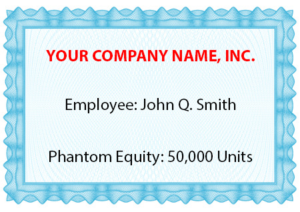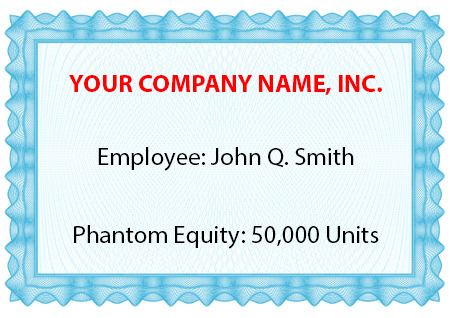 If you’re tight on working capital or don’t want to give up partial ownership of your company by granting shares or stock options, you may want to consider using phantom equity (PE) to compensate employees and independent contractors who are essential to the growth of your business.
If you’re tight on working capital or don’t want to give up partial ownership of your company by granting shares or stock options, you may want to consider using phantom equity (PE) to compensate employees and independent contractors who are essential to the growth of your business.
What is Phantom Equity?
Phantom equity is a means to reward employees later (deferred compensation) when you can afford to do so. It’s common to tie such payments to key events for your company, such as meeting an annual revenues target for your products/services, sale of the business, a successful venture capital round, or your company goes public (IPO).
According to Texas Internet Lawyer Mike Young, whatever you choose as the payment triggering event must make sense as a “carrot” because you want to encourage workers to stay with you and perform in order to receive the compensation.
If structured correctly, you’re getting the same benefits from the workers with PE as if you had awarded sweat equity but without the headaches of dealing with minority shareholders in the process.
How Do You Pay Phantom Equity?
There are a variety of ways to pay out PE to your workers. Popular methods include:
- A single lump sum payment triggered by one event
- A series of bonuses paid as multiple milestones are achieved
- Extra payment(s) into employee 401k retirement accounts
Who Should Receive Phantom Equity?
Because phantom equity is deferred compensation that reduces your share of the monetary pie, be careful who you choose to give it to. If an employee or independent contractor is essential to the success of your business, then that person is a potential candidate for PE, particularly if they’re willing to work for less now with the promise of deferred comp later if they perform.
However, if you can easily replace the worker with someone else, chances are phantom equity should not be included as part of that worker’s compensation package.
Setting Up a Phantom Equity Plan
Working with an experienced business lawyer and your accountant, you can form a phantom equity plan that’s right for growing your company with respect to, eligibility, vesting, and other legal and tax issues.

